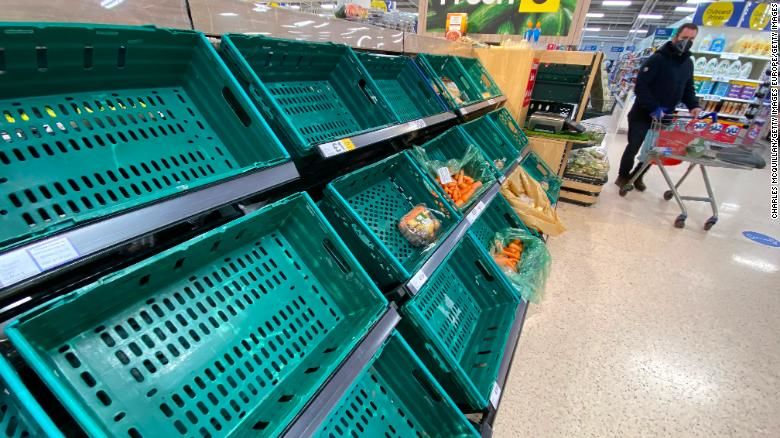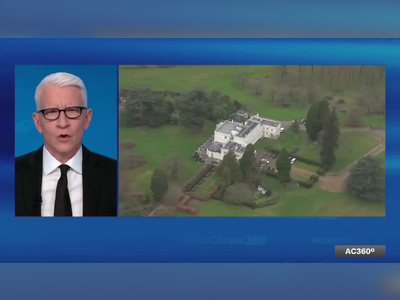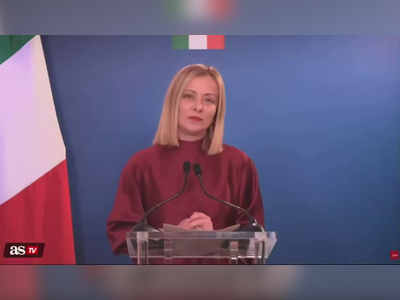
The hard reality of Brexit is hitting Britain. It's costing everyone but Boris Johnson
"The cold stores didn't have enough space to hold our crops, so we had to throw away a week's worth of production," explains Iain Brown, vice chairman of East Scotland Growers (ESG). "And we've not had enough workers to harvest our vegetable crops, meaning they are going to waste."
While food shortages have been common in many countries over the course of the pandemic, Brown believes that one issue unique to the UK is making life extra painful: Brexit.
According to Brown, the two essential prongs of production -- first, getting fresh food out of the ground, and then distributing it onto supermarket shelves -- are both taking a hit due to a lack of workers.
First, a lack of truck drivers, who take fresh items like cauliflowers to and from freezing facilities, meant that the ESG cooperative at one stage had to throw away a week's worth of production, at an estimated cost of £1 million ($1.4 million).
Second, Brown says that many of the seasonal workers, who would come from countries like Romania and Bulgaria for a few months to harvest vegetables, are now in short supply.
"Some didn't come because the Covid regulations make it too hard; some came, made a lot of money, and went home earlier than planned." This, Brown says, meant about 10-15% of his crop went to waste, costing around £200,000 ($277,000).
It seems that the consequences of Brexit are finally being felt up and down the UK. And far from the sunlit uplands promised by members of Prime Minister
Boris Johnson's government, a shortage of European workers in these vital areas means financial losses for businesses and empty shelves as the UK hurtles towards Christmas.
The shortage of truck drivers is probably the most immediate issue.
The current driver shortage is estimated to be between 90,000 to 120,000, according to a spokesperson for Logistics UK. While Brexit is not entirely to blame, the fact that the UK no longer has easy access to European drivers has created a headache for the industry.
 A supermarket customer looks at the near empty shelves in Tescos on January 14, 2021 in Belfast, Northern Ireland.
A supermarket customer looks at the near empty shelves in Tescos on January 14, 2021 in Belfast, Northern Ireland.
These people cannot simply be replaced by British workers. Besides the fact it can take up to nine months to qualify as a driver and cost up to £5,000 ($6,940) according to Logistics UK, Brits are not lining up to take these jobs.
"We have an aging workforce in the UK and the image of working conditions for lorry [truck] drivers -- unsafe parking spaces or places to rest up -- has made it unattractive for lots of younger people," a spokesperson for Logistics UK told CNN Business.
This creates a hard choice for companies: What goods do you prioritize? If you have only one truck leaving your warehouse that day, you are probably going to prioritize perishables over things like bottled water. In the long run, this means less consumer choice and the possibility of consumer panic, as was seen in 2020 when Britain ran short on supplies of toilet paper.
For some idea of how serious a problem is, the bosses of Britain's biggest supermarkets have described the food shortages as unprecedented -- one told The Times newspaper they were "at a worse level than at any time I have seen" -- and warned that shelves could be bare at Christmas due to a lack of drivers.
These shortages should be a gift for Johnson's political opponents, who can say that his claims of having an "oven ready" Brexit deal in 2019 -- the promise on which he won a general election -- were false.
The government, critics say, failed to adequately prepare for the inevitable consequences of Brexit and mitigate its initial impact.
UK GDP growth ground to a near halt in July, according the Office for National Statistics, in part because of supply chain issues and worker shortages. Britain's economy remains 2.1% smaller than before the pandemic, and some economists think the difference won't be made up until the second quarter of next year.
"Throughout the whole Brexit process the government found its efforts to get business and people prepared for the inevitable upheaval undermined by its need to present Brexit as something that would be positive for the UK and the economy," says Sam Lowe, a senior research fellow at the Centre for European Reform. "This led to confusing radio adverts that didn't even mention the word Brexit, delayed guidance, and last-minute changes of heart."
Worse, Johnson's government is now in the strange position of refusing to implement a key part of the deal it once hailed as a great success.
The UK was supposed to fully enforce a mechanism called the Northern Ireland Protocol later this year. The Protocol was agreed between the UK and EU to reflect the special status of Northern Ireland: Out of the EU, along with the rest of the UK, but sharing a soft land border with the Republic of Ireland, an EU member state.
Under the Protocol, goods can flow freely between Northern Ireland and the Republic, avoiding the need for a hard border -- an essential measure in preventing a return to sectarian violence on the island. The UK agreed that it would in turn protect the EU's single market by enforcing checks on goods entering Northern Ireland from Britain.
Doing so would effectively create a sea border between Northern Ireland and the rest of the UK, something that would be very uncomfortable for Johnson, who likes to portray himself as an arch defender of the Union. It would also be anathema to the unionists in Belfast, who this week threatened to collapse the region's fragile power-sharing arrangement over the issue.
The last thing that Johnson, the man who led the Brexit campaign in 2016, wants to do is allow his opponents to claim that Brexit has not only cut Northern Ireland off from the rest of the UK, but knowingly put additional pressure on both finances and stability in the region.
This could explain why Brexit Minister David Frost said on Monday that the grace period allowing goods to flow from Britain to Northern Ireland would be extended, with no fixed end point.
This, naturally, has allowed the EU, the long-time bogeyman of Brexiteers, to take the moral high ground, reminding Britain that the Brexit deal Johnson willingly signed is a legal treaty.
These issues, while important, are far from the only post-Brexit embarrassments that make Johnson's "oven ready" claims look a little silly.
Despite assuring British fisheries they would not be hit by difficulties importing into mainland Europe, catches are being thrown back into the water, as boats are unable to land and process their fresh product in time for it to be sold.
Lawmakers in Johnson's own party have been receiving phone calls from constituents angry that they have been unable to get their goods into Europe because of Brexit.
"They know we can't do anything in a lot of instances. The government's websites are not very helpful and they simply are not getting the help they need," one lawmaker on the government payroll previously told CNN. "It's difficult. They are angry that people are canceling orders and that I personally cannot get a French visa for them," they add.
And according to a Reuters report this week, Britain is "on course to lose its status as one of Germany's top 10 trading partners this year for the first time since 1950," citing "Brexit-related trade barriers" as the cause.
All these difficulties were predicted by numerous critics of Johnson, as industry bodies lobbied the government for alternative arrangements to mitigate damage. Johnson has been repeatedly criticized by industry leaders and opponents for what they see as his reckless lack of preparation for Brexit.
Despite this, Brexit's fallout is not being used by Johnson's political opponents, who are instead whacking him over domestic issues. But why?
"The problem with these sorts of stories is they happen incrementally," says Rob Ford, professor of politics at the University of Manchester.
"One of the very tragic things about these stories is that in order for the public to really pay attention to them, something really dramatic has to happen.
Unfortunately, that might be an overworked lorry driver crashing into a family car or children falling ill through malnourishment."
Until that point, Johnson can largely deflect the blame for these problems onto the pandemic. Ford notes this goes down well with his base of "Leave" voters, many of whom are sick of being told that Brexit was a disaster, and often willing to believe other explanations.
But Brexit really is starting to bite. It was never going to be the case that the UK would immediately fall apart. But little by little, many of the assurances made in 2016 and during years of negotiations are cracking.
Perhaps one day Johnson will deem it politically expedient to introduce greater mitigation against the downsides of Brexit. Yet even the timing of that is problematic: Admitting you need damage control means there is damage to control.
And, given that much of Johnson's political legacy will be defined by leading the campaign to "free" Britain from Brussels, the longer he can dodge criticism for not just Brexit as a concept, but his chosen implementation of it, the less his greatest accomplishment becomes a millstone round his neck.











